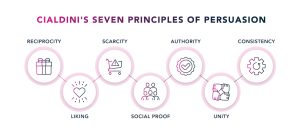The power of persuasion has a transformative impact on consumer behavior. Cialdini’s Seven Principles of Persuasion provides a valuable framework for brands to engage with influencers, ultimately leading to positive brand perception, increased engagement, and ROI. Influencer Marketing Hub suggests that in 2023, the influencer-marketing industry will be worth 21.1 billion dollars, with over 50 million people seeking to capture the world’s attention.
Use the Cialdini Principles of Persuasion to Inform Influencer Campaigns
Robert Cialdini, American Psychologist globally recognized as an expert on influence and how to ethically apply it in business settings, conducted research to understand the most successful techniques to persuade others. He devised ‘The Seven Principles of Persuasion,’ a framework that has widely been adopted as a way to understand human behavior in order to influence others.
The seven persuasion principles are: reciprocity, scarcity, authority, consistency, liking, social proof and unity. Cialdini’s principles break down how marketers and influencers can impact consumers’ views, feelings, and decisions. When brands are developing influencer marketing campaigns, they should use this framework when deciding who to partner with for their next social media campaign and the approach to messaging the influencers should take when curating content about the brand.
Reap The Benefits of Reciprocity
The act of reciprocity is a reciprocal exchange of mutual privileges and benefits. In an influencer marketing environment, reciprocity can exist in a variety of ways. Take the popular influencer Jenna Palek, for example. Jenna is known for creating content that is relatable and authentic to the younger, working generation. She’s a lifestyle influencer who does not focus on just one specific lifestyle niche but instead shows all aspects of her life including her relationship, fitness tips, beauty, and business. Brands frequently engage with her because of her high engagement rates and diverse audience.
If Jenna were to negotiate with a brand to offer a promotion code that is only available to her followers, this would be a form of reciprocity because it creates a sense of obligation to reciprocate. If her followers think that she went through the trouble of securing a discount they are more motivated to do something for her, such as engaging on her social platform and/or making a purchase of a product that she is recommending. The brand also profits, of course, because people will use the promotion code to make product purchases and hopefully, they will become loyal brand customers.
Create a Sense of Urgency with Scarcity
In influencer marketing, scarcity creates a sense of urgency and exclusivity, establishing demand for the product or service. This can be demonstrated with offers like exclusive giveaways, holiday or flash sales, and limited-edition items. Consumers have a fear of missing out, which drives engagement and encourages followers to act quickly. When a brand is working with an influencer and wants to establish scarcity, influencers should use phrases such as, “Today only,” “Last chance,” and “Don’t miss out.”
Partner with Influencers Who are Experts in Your Industry
Partnering with influencers who are experts in a specific subject matter or niche can help brands reach their target audience. Influencers are considered authority figures, so consumers are more likely to take their advice and recommendations because they trust them.
Karalynne Call, also known as @just.ingredients on Instagram, is a Certified Nutritionist and Mental Health advocate who has over one million followers. She is known for giving advice about healthy ingredients and brands you can substitute for unhealthy ones. Due to her authority in the nutrition environment, she owns a successful supplement shop, and brands and public figures want to work with her to promote their supplements and other products through her social media channels and podcast.
Utilize Influencers to Generate Consistency
When a brand creates long-term partnerships with specific influencers that align with their audience, it builds consistency. If an influencer is regularly promoting a product for an extended period of time, brands capitalize on this consistent messaging. Due to the message repetition, brands will have a built-in audience who trust the brand because they trust the influencer. This leads to a higher conversion rate, and brands see an immediate impact on sales.
For example, Alo Yoga partners with fitness gurus that have large followings and have previously posted about their apparel numerous times. By forming these partnerships with the right influencers, customers consistently see the same leggings in their favorite influencer’s posts, so it results in them adopting similar likings and behaviors.
People Are Influenced by Those They Like
When brands partner with influencers, it is also because they are well liked, and their followers can relate to them. Customers are more easily influenced because of the illusion of connection. Cialdini’s principle, liking, explains why consumers feel a sense of similarity, loyalty, and have a positive association with influencers they follow. Think of an instance when you felt like you related to or felt a genuine connection with an influencer. Did they have similar interests, experiences, and viewpoints as you?
Dunkin Donuts’ collaboration with Charli Damelio is a prime example of a brand that used an influencer who is very well liked to increase their coffee sales. Charli, who now has 151.1 million followers on TikTok and 11.5 billion likes on Instagram, partnered with Dunkin Donuts to create her own signature drink, “The Charli”. This campaign led to a 57% increase in app downloads and sales were up 20% the day the campaign launched.
Influencer Marketing Is a Powerful Tool for Social Proof
Social proof is established when users like, comment, and follow an influencer. Influencer marketing, in general, relies heavily on this principle because it measures the success of the campaigns, specifically, the conversion rate, follower count, and click-through rate. The influencer’s endorsement serves as social proof that the brand is credible.
DAE Hair is a company that actively utilizes the influencer, Emilie Kiser, as social proof for their haircare products. Emilie, who has 2.5 million followers on TikTok, is known for her “get ready with me” series and hair styling videos. She avidly uses and posts DAE Hair products on her platforms, so her endorsement of their products has inspired many to purchase DAE Hair products for themselves.
Create Unity by Aligning Your Brand with Creators with Shared Values
Brands can create a sense of unity with their customers by working with influencers whose values, beliefs, and therefore content align with their own mission and values. For example, Patagonia uses the unity principle in their environmental activism campaigns. They don’t pay influencers to promote their products, instead they choose to collaborate with creators that share similar values. Patagonia’s self-imposed ‘Earth tax’ provides support to environmental nonprofits working to defend air, land, and water around the globe. As a result, people that share those same values feel a sense of connection with Patagonia and are in turn motivated to purchase their products because they are making a difference in the world. Brands should focus on working with influencers that create a sense of unity with their followers because they are more likely to be engaged and easily persuaded.
Use Cialdini’s Seven Principles of Persuasion When Working with Influencers
The psychology behind influencer marketing is quite complex. It’s important to be selective when working with influencers. Do your research and select an influencer that aligns with your brand rather than selecting one at random. Using principles and a framework like Cialdini’s can help identify the right influencers to partner with, as well as demonstrate reciprocity, consistency, social proof, authority, liking, and scarcity. Following Cialdini’s Seven Principles of Persuasion ensures that a brand will get the best return on their investment.

